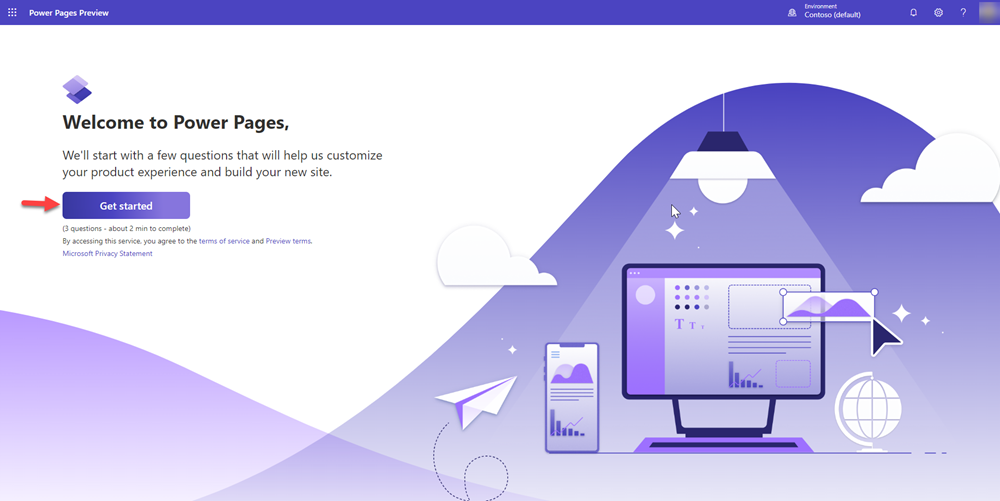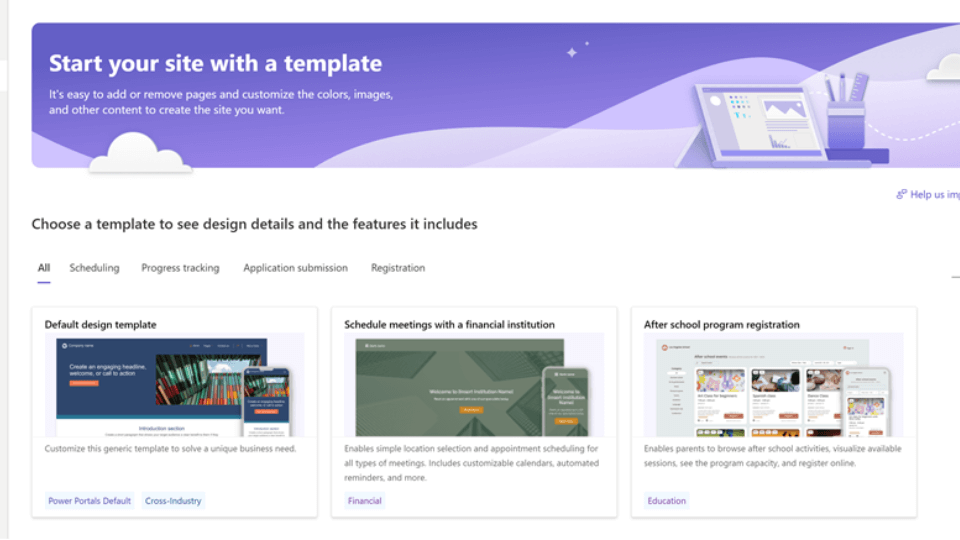The most powerful way to publish and share your ideas.
Microsoft has just recently made it easy for their creators to obtain a brand-new platform designed for building affordable business-centric websites, named Microsoft Power Pages (MPP). Whether you have a low-code plan or are a professional developer working on the project, the initiatives taken by this company will empower you to create engaging content more easily and swiftly. So, this affordable and scalable solution empowers you to build business-centric websites easily and quickly.
Streamline business processes and easily automate workflows using low-code development tools.
Power Pages makes it easier for organizations to rapidly create and manage beautiful and highly customizable websites without technical expertise from IT. This solution is significantly different from Power Apps Templates, a feature of PowerApps, which only allowed users to quickly create external portals. Power Pages takes the portal experience even further by providing much more powerful capabilities for page creation using a visual, low-code model that does not require any coding skills at all. This allows employees or customers to easily build their own pages or for IT professionals to customize applications on behalf of their organization, with advanced security capabilities built right in along with modern design tools and other customizations that larger organizations need.
Low-code web development is not just useful for basic projects like a site to showcase a company profile or use as an e-commerce platform for other content! With Power Pages, you can do that and so much more such as support enterprise-wide, professional solutions at scale.
– Charles Lamanna, Corporate Vice President
Build powerful business websites in minutes
With an adaptable extensibility path for Microsoft Power Platform, it is now much simpler across broad varieties of industries to streamline business processes and enhance efficiency through automated workflows to ultimately streamline business processes and streamline end-to-end business procedures for any company. Microsoft Power Platform is far better by itself. Users can now complete comprehensive low-code business processes and completely automate workflows that generate a seamless end-to-end business solution for your company. Microsoft Power Platform functions together perfectly.

Microsoft Power Pages Features in a Nutshell
- A powerful design studio that allows you to customize your power pages site in just a few clicks.
- Create your own layouts and styles and preview the changes in real-time.
- Customize your website without needing to code. This makes creating a website as easy as designing a PowerPoint Slideshow.
- Choose a style that fits your brand. Choose from over many pre-built themes that can be customized and extended to match your brand.
- Publish your website to the web and get your new site up and running in minutes using unlimited content blocks and pages.
- Design your own website pages with drag-and-drop technology.
- A one-stop solution for website building, modeling, visualizing and publishing.
- Save time in achieving your goals: Create professional modern-looking, engaging and interactive websites within a few minutes.
- Make your website a central hub for all your business information.
- Create a powerful site that drives conversions and increases sales.
- Build a site with a single click and focus on business.
- Create responsive and engaging pages that can be viewed on any device.
- Highly customizable, drag & drop user interface.
Limitations of Using CMS in Website Development
- Plugin and widget dependency and hidden costs
Users must be dependent on plugins and widgets for most of their functionalities and charges to access full features.
- Site load speed and Maintenance
Running a CMS site takes a tremendous amount of effort to maintain, from customized configurations and plugins, installed themes, site configuration and security updates.
- Common vulnerabilities
To name a few are Brute Force Attack, SQL Injection, Cross-Site Scripting, DDoS Attack, File Inclusion Exploits, Directory Traversal
- Scalability and functional limitations
When software systems and data sources become too much to handle, CMS is unlikely to integrate well with the workflow of the larger ecosystem so having a good system in place is vital. If you have too many users using the system or are using it for a specific purpose, the software will not be able to keep up with system demands.
All of these CMS challenges show why a carefully built website goes beyond templates and plugins—it creates a system that works smoothly for your business. A strong website design focuses on speed, security, and efficiency from the start, cutting down on hidden costs and plugin dependency. Built-in features reduce common vulnerabilities and help the site scale as traffic and functionality demands increase.
Businesses can turn to Karakas Webdesign SEO Agency for a website that balances creative design and technical strength, handling high user activity and complex workflows while keeping performance and functionality top-notch. With the right design strategy, a website can become a powerful tool that grows alongside the business, not a bottleneck.
Design Studio

There’s a fantastic new feature that’s added in the latest version of Studio that allows you to edit your page layouts more easily. You can add and change components like text, images, sections, lists, forms and more – so we hope this will help you create even better designs going forward.
The Power Pages design studio is an intuitive interface that enables low-code makers to build and configure rich business web apps.
Power Pages Themes
Power Pages delivers mobile-ready templates and a fluid visual experience with a supercharged design studio, along with a new, integrated learning hub that quickly enables you to build sites as unique as your business.
When creating a site, you might have to create, update, or read business information. Consider a page that’s used for collecting feedback, showing a list of available classes, or rescheduling an appointment. Typically this type of information is stored in a database. Microsoft Power Platform has a powerful cloud-based data service called Dataverse. Dataverse not only stores information like a traditional database, but also provides features for security, analytics, automation, and more.
Power Pages sites are unique, but they have components that use these model-driven app views and forms as a foundation to build interactive, data-driven webpages.
Run, Scale, and Monitor all your applications.
Microsoft Azure offers developers a comprehensive and flexible set of cloud technologies and tools in a robust, global-scale infrastructure to create websites, mobile apps, games, and enterprise solutions. You may need help from experts that can help you make important business decisions that will affect your project’s success whether it be about marketing or finance, for example. Finding a trusted source that lets you consult with them regarding complicated matters is the only way you will be able to overcome those obstacles without crashing your vehicle on the first speed bump you come across along the way.
Our expertise lets you focus on your business website builder platform.
When visitors come to your site, allow them to securely access and share information using Microsoft’s Dataverse. This cloud-based platform supports improvements on security when adding a layer of protection for data sources within Microsoft Azure. Additionally, you can use it.
When we think of Microsoft Power Pages, we think of free resources. We love their comprehensive learning material and after the 5-day trial, many people choose to sign up for Office 365 and keep those tools at their fingertips all year round! People love the full control plan because it allows users to create a fully customized website that everyone can use.
Where customers are using power pages
- FAQ Pages
- Enterprise Websites
- Community Services related websites
- Customer self-service web applications
- Partner/vendor on-boarding, tracking and support
- Interactive and data driven web site for business partners/vendors








